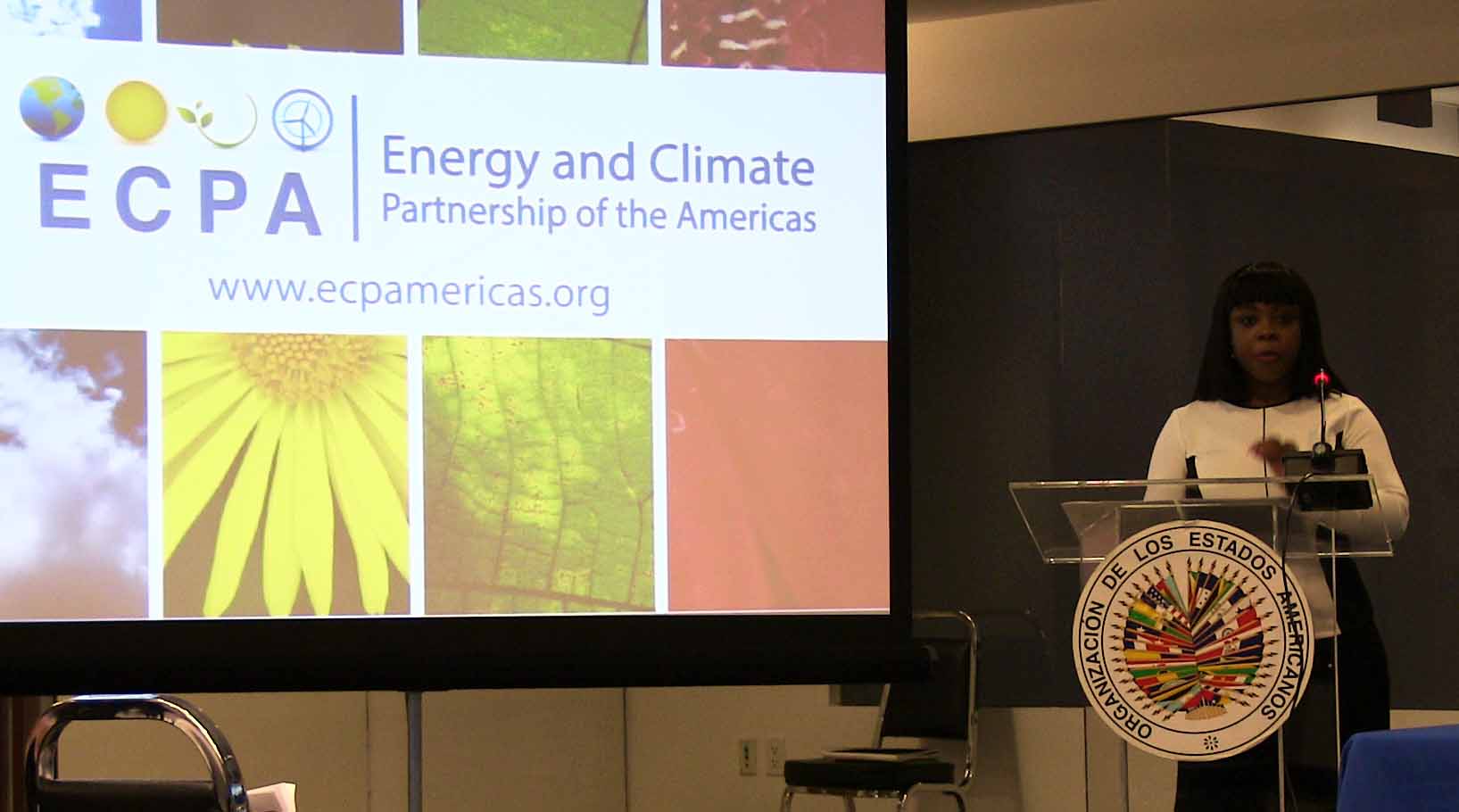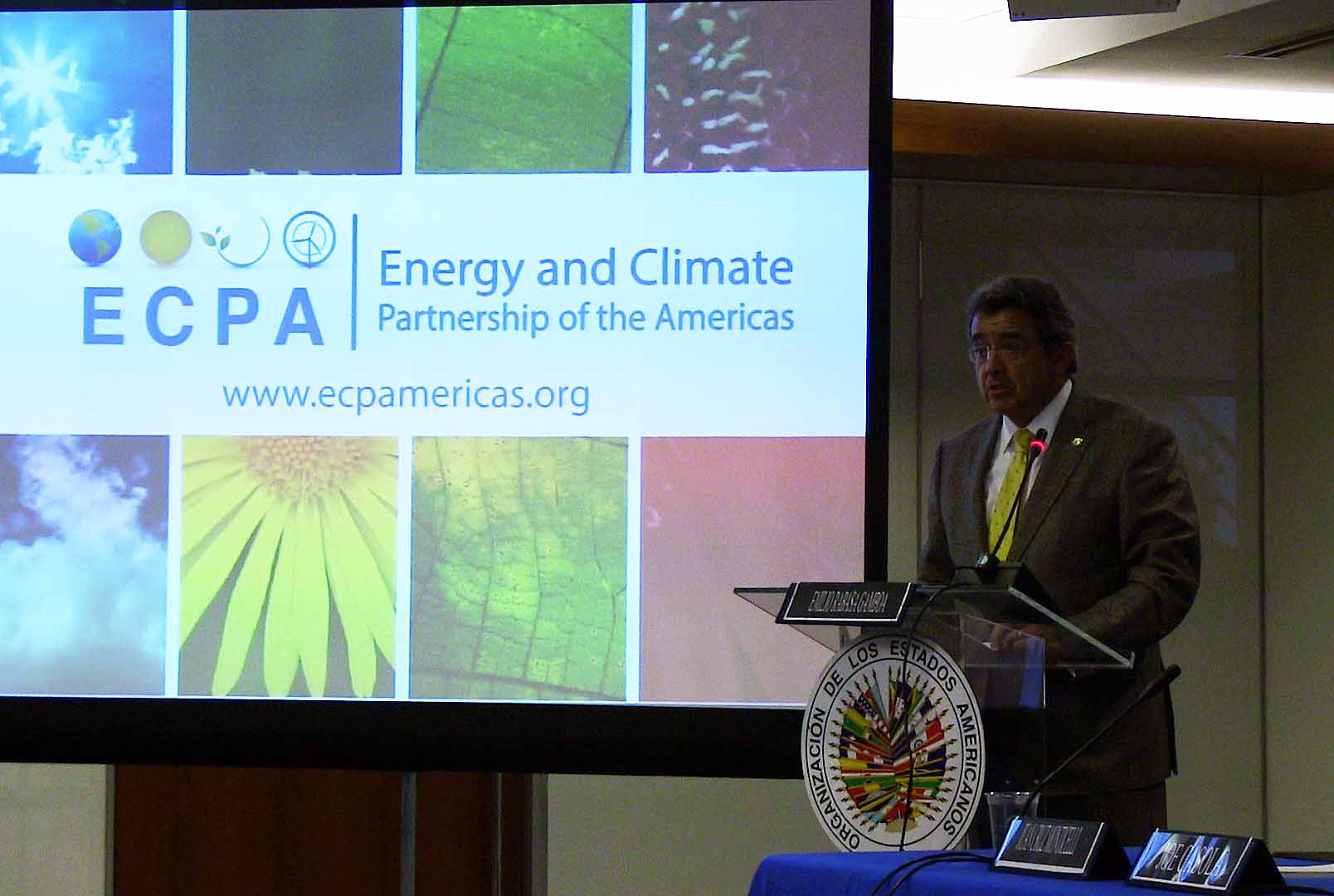On January 16 the ECPA Clearinghouse, hosted by the
OAS Department of Sustainable Development (DSD), convened a public discussion forum on energy and climate change education with the aim of identifying ways to advance greater energy and climate change awareness, education and literacy across the Americas. The event facilitated open debate among a diverse group of Latin American and Caribbean governments and stakeholders on energy and climate literacy, institutional collaboration and access to information, all of which are considered key factors for promoting a culture of sustainability in the Americas. The forum was held under the auspices of the
Energy and Climate Partnership of the Americas (ECPA).

Close to 50 government officials from the Americas, academic and civil society representatives, and energy and climate practitioners partook in a discussion on sustainable energy alternatives and climate change mitigation solutions. Sherry Tross, Executive Secretary for Integral Development at the OAS, who spoke at the event stressed that “it is not possible to look at climate change issues from a purely national perspective. The implications and impacts are trans-boundary and the solutions, of necessity, must be both multifaceted and shared.” Tross added that “ECPA, through its different initiatives, has sought to engage multiple stakeholders, facilitate the sharing of best practices, and support innovative, community-based solutions.”
Joe Casola, Program Director for Science and Impacts at the Center for Climate and Energy Solutions, spoke of the importance of climate change literacy, noting that education helps to “personalize the threat of climate change”, which he called “fundamental for better understanding and embracing the challenges that this shared reality imposes”. Dr. Casola made reference to the fact that the conversation on climate change is driven by informational “elites”—scientists and policy specialists—and is not always inclusive of lay people whose understanding of the environment can have a major effect on climate change. Jorge Piñon from
The University of Texas at Austin reminded participants of the importance of building the capacity of educators to impart climate change training and literacy.
Ambassador Emilio Rabasa Gamboa, Permanent Representative of Mexico to the OAS, highlighted that this is an issue of the  utmost importance for his government, noting that “Mexico’s National Climate Change Strategy and Climate Change Law, among other activities proves that we are moving forward to comply with our international commitments.” As a regional leader, Mexico chairs ECPA’s Energy Efficiency Working Group, whose work was presented by Ambassador Rabasa. In 2014, the dialogue series will continue to engage multiple stakeholders in an exchange of best practices that support effective energy and climate change policy making and strengthen collaboration in the Americas.
utmost importance for his government, noting that “Mexico’s National Climate Change Strategy and Climate Change Law, among other activities proves that we are moving forward to comply with our international commitments.” As a regional leader, Mexico chairs ECPA’s Energy Efficiency Working Group, whose work was presented by Ambassador Rabasa. In 2014, the dialogue series will continue to engage multiple stakeholders in an exchange of best practices that support effective energy and climate change policy making and strengthen collaboration in the Americas.
This was the first in a series of four public discussions forums geared toward fostering energy and climate change dialogue in Washington. Future forums will focus on the impact of natural gas resources on North America’s energy future, partner engagement in the activities of ECPA, and current climate change adaptation strategies. Information about these forums will be published on line at http://www.ecpamericas.org/events/default.aspx?catid=104.

 Close to 50 government officials from the Americas, academic and civil society representatives, and energy and climate practitioners partook in a discussion on sustainable energy alternatives and climate change mitigation solutions. Sherry Tross, Executive Secretary for Integral Development at the OAS, who spoke at the event stressed that “it is not possible to look at climate change issues from a purely national perspective. The implications and impacts are trans-boundary and the solutions, of necessity, must be both multifaceted and shared.” Tross added that “ECPA, through its different initiatives, has sought to engage multiple stakeholders, facilitate the sharing of best practices, and support innovative, community-based solutions.”
Close to 50 government officials from the Americas, academic and civil society representatives, and energy and climate practitioners partook in a discussion on sustainable energy alternatives and climate change mitigation solutions. Sherry Tross, Executive Secretary for Integral Development at the OAS, who spoke at the event stressed that “it is not possible to look at climate change issues from a purely national perspective. The implications and impacts are trans-boundary and the solutions, of necessity, must be both multifaceted and shared.” Tross added that “ECPA, through its different initiatives, has sought to engage multiple stakeholders, facilitate the sharing of best practices, and support innovative, community-based solutions.”  utmost importance for his government, noting that “Mexico’s National Climate Change Strategy and Climate Change Law, among other activities proves that we are moving forward to comply with our international commitments.” As a regional leader, Mexico chairs ECPA’s Energy Efficiency Working Group, whose work was presented by Ambassador Rabasa. In 2014, the dialogue series will continue to engage multiple stakeholders in an exchange of best practices that support effective energy and climate change policy making and strengthen collaboration in the Americas.
utmost importance for his government, noting that “Mexico’s National Climate Change Strategy and Climate Change Law, among other activities proves that we are moving forward to comply with our international commitments.” As a regional leader, Mexico chairs ECPA’s Energy Efficiency Working Group, whose work was presented by Ambassador Rabasa. In 2014, the dialogue series will continue to engage multiple stakeholders in an exchange of best practices that support effective energy and climate change policy making and strengthen collaboration in the Americas.  View Map
View Map